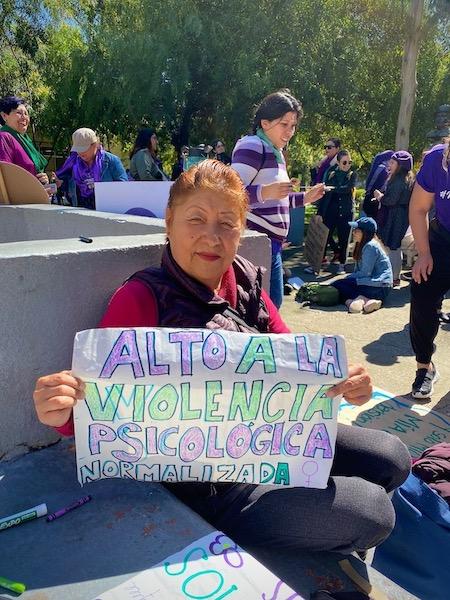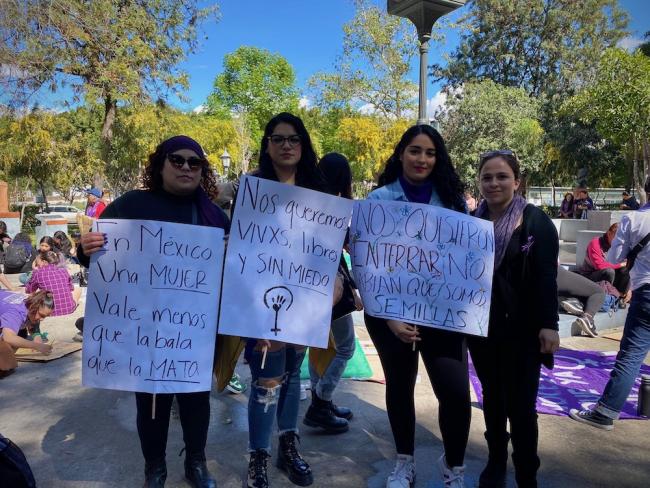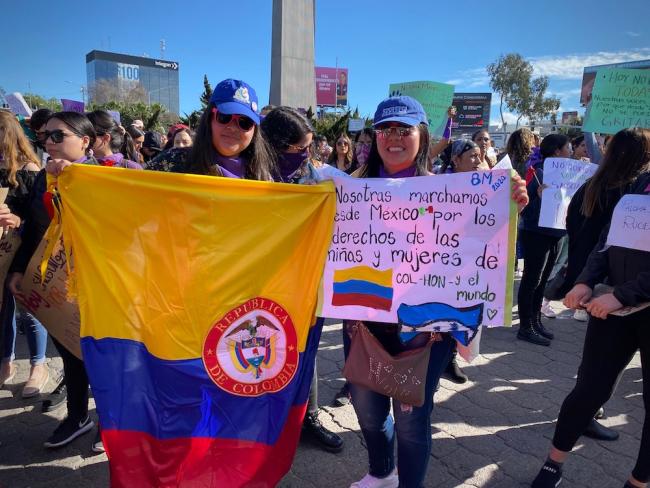
Millions of women in Mexicoand across Latin Americaparticipated in historic mobilizations denouncing discrimination, femicides, and other forms of gender violence during the 8 de Marzo (8M) protests, followed by the first women-led national strike in Mexico, El Paro Nacional (9M). The strength, unity, and sororidad among women who participated in the protest and the strike demonstrated the urgency for women-led resistance movements in Latin America that disrupt patriarchal barriers.
In Tijuana, more than 2,500 women participated in the 8M protest. Many chanted powerful slogans, including some phrases from “Un Violador en tu Camino” from the Chilean collective, Las Tesis. The sight of Tijuanense women marching together in the streets, from all ages and parts of the world, made many first-time protestors feel safe, including mothers like Maria de la Luz Garibay, who felt comfortable for the first time in her lifetime attending a protest for a feminist movement. “It is easier to protest today because society is more open. There are families worried about their daughters’ future,” she said. “Tomorrow I am not going to work in order to make my voice heard. They are forced to look at us.”
The Paro Nacional was also a direct attack on capitalism and patriarchy, as many women chose to be absent from work to demonstrate the vitality of women in all sectors of society. Most of the demands to eliminate impunity for gender violence centered around systematic changes in Mexico. However, gender violence seeps beyond nation-state boundaries and disproportionally affects vulnerable communities. In border regions, women experience sexism compounded with the pressures from capitalism, racism, classism, and displacement from Mexico and other nations. Furthermore, the demands of Indigenous and impoverished women, members of the LGBTQIA community, and migrant women are rarely at the forefront of feminist movements. Thus, the significance of the 8M and the Paro Nacional mobilizations, particularly in Mexican border cities like Tijuana, is about bringing visibility to the various systems of oppression that render us invisible transnationally, amplifying the voices of vulnerable women that are often excluded from feminist resistance movements, and transforming protests at the national level condemning machismo to a Latin American feminist revolution.

Femicides as Everyday Violence in Border Cities
During the 8M protest in Tijuana, one of the protest organizers said through a megaphone, “Take care of yourself. Do you know the power of that phrase? It assumes that we will be harmed.”
10 women are killed in Mexico every day, and in 2019 there were 1010 femicides, or at least those that have actually been registered. According to the National Human Rights Commission (CNDH), 90 percent percent of femicides are unresolved and unpunished. Often, the victims are blamed for their own death. The brutal murders of Ingrid Escamilla (age 25) and Fatima Cecilia (age 7) are among the cases that have caused uproar among women in Mexico. Many women participating in the 8M protests in Tijuana were present in solidarity of local murdered and disappeared women, including Marbella Valdez Villareal (age 20), who was kidnapped and later found murdered in a trashcan in February this year, and Diana Piggeonountt (age 15), who has not been found since June 2018. Many of the women I interviewed at the 8M protests in Tijuana almost unanimously mentioned that the recent rise in femicides and disappearances made them afraid to leave their homes or walk alone on the streets.
In the 1990s, femicides became rampant in border cities such as Ciudad Juarez after NAFTA displaced many female workers from the interior of Mexico, particularly impoverished and Indigenous women, forcing them to relocate to border cities to work for exploitative sectors such as maquiladoras. Women’s labor has long been commodified due to Mexico’s lack of livable wagesoften paying women as low as $55 a weekand lax labor regulations allowing work shifts over 12 hours with no overtime pay. The Paro Nacional was an attack on capitalism and patriarchy, forcing employers and Mexican society broadly to come face-to-face with machismo culture that has contributed to our perpetual invisibility and insecurity, especially in border cities.
Disappearances and femicides have persisted throughout the decades, particularly under President Calderón’s Drug War, in which organized crime and the drug trade doubled femicide rates in Mexico. Despite the environment of insecurity and corruption, Mexico’s president, Andrés Manuel López Obrador, has called these mass feminist mobilizations “opportunistic” and turned a blind eye on the crisis of femicides during his administration by blaming neoliberalism. In response to the government’s neglect of femicide victims, 8M participant Almara Niebla said, “As a mother, you do not know if your daughter is going to come back. Seeing all of these women, you realize the magnitude of the problem. You hear stories about femicides, but they are much graver than what the government tells us.”
The lack of accountability for femicides and other forms of gender violence continuously terrorize women to the point that femicide has become synonymous with being a woman in the Mexican borderlands.
The exceptionalism of gender violence in border cities is rooted in transnational pressures heightening social and class differences. Transborder and migrant women are exposed to gender violence in multiple contexts and countries, including violence from Mexican authorities, Mexican military guarding the Mexico’s border, CBP officers, U.S. law enforcement, and everyday misogyny and sexism in their countries of origin. “In a border city, we have a lot of diversity. Migrant women and border girls experience violence from diverse sectors,” said Gabriela Manriquez Martinez, who felt compelled to participate in the protests to not only make her own voice heard, but to stand in solidarity with women who are often stigmatized for participating in protests and strikes. “For the first time in the history of this country, women are taking the lead in the movement.”

Latin American Women United Against Gender Violence
Tijuana is a city of migrants where many individuals from Mexico and other parts of the world settle, in some cases permanently, in search for a better life. Migrant women in particular are extremely vulnerable to kidnappings and disappearances, particularly after the implementation of the “Remain in Mexico” policy, in which the U.S. collaborates with Mexico to return asylum seekers to Mexico for months while they await court dates. This cruel policy exposes womenparticularly Central Americansto police brutality, kidnapping, rape, torture, and femicide. Furthermore, the Safe Third Country agreements between the United States and Guatemala, El Salvador, and Honduras inhibit women from fleeing violence. Instead, the agreements keep women in countries where there is also impunity for domestic violence, femicides, and sexual assault. Sofia Saldivar, who also participated in the 8M protests in Tijuana, recalled how her own family was forced to flee Guatemala due to ongoing violence in the region. “In Guatemala, military forces repressed women, particularly Indigenous women. This affected my mother a lot. Mistreatment towards women has been an inter-generational issue. My grandmother fled from Guatemala and became the primary support for her five children. After unsuccessfully crossing the border into the U.S. three times, she realized that she could also make a living in Tijuana. We are fronterizos pioneros and established roots here.”
While the femicide statistics in Mexico are staggering, Mexico is just one of the many countries in Latin America that continue to neglect women’s rights. U.S.-funded coups and drug wars throughout Latin America have forced women to flee from their countries, exposing them to gender violence from multiple nations while in transit. Thus, the 8M protest was more than just the uprising of Mexican womenit was the uprising of women throughout Latin America, united in the struggle against patriarchy, capitalism, and state violence. Rossana Lopez, a Colombian volunteer for a migrant shelter in Tijuana, said, “At this moment, I can go out and protest for the violence that my family and so many other women suffer in Colombia. Machismo runs in our family, women experience mistreatment, some women are prohibited from working.” Similarly, Jazmin, who is also a volunteer in Tijuana from Honduras, said, “Honduras is a country where there is so much injustice and corruption. Many women are raped. Being here [in Tijuana] allows me to represent my country, all of the women that have experienced rape. We are ultimately all fighting for the same cause.”

The Beginning of the Latin American Feminist Revolution
The 8M protest and Paro Nacional are connected to the rising tide of resistance movements throughout Latin America similarly seeking to denounce corrupt politicians and oppressive government agencies. These mobilizations provide much needed strength and unity among those who are left behind by our own governments. It’s a crucial time to fight collectively against a world that is made for men, where our lives, even in death, remain invisible. In order to challenge machismo, gender violence, and inequality directly, we need to call for the abolition of borders, prisons, and binary notions of gender that perpetually exclude vulnerable women in Latin America, and to bind feminist struggles with struggles of class, race, sexuality, and displacement. In the midst of a Latin American feminist revolution, we have the potential of moving away from simply seeking to reform government agencies that have always ignored us, to demolishing oppressive systems that inhibit our collective liberation.
Estefanía Castañeda Pérez, is a Ph.D. Candidate at the UCLA Department of Political Science researching CBP’s border enforcement practices at land ports of entry and their impact on the transborder commuters and asylum seekers. Follow her on Twitter: @transb0rder

